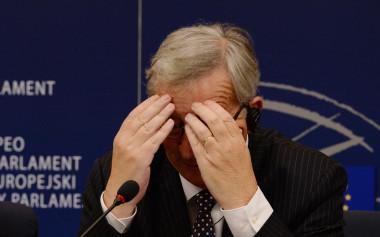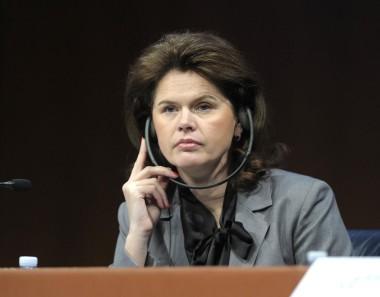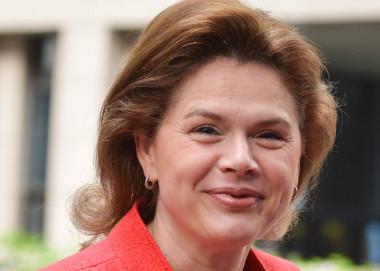Komisarska saga
http://www.europeanvoice.com/article/women-commissioners-juncker-struggles-to-reach-eight/
Women commissioners: Juncker struggles to reach eight
A decision at Saturday's EU summit on who should be foreign-policy chief holds the key to all other appointments.
by Dave Keating and Tim King on 27.08.2014 / 08:21 CET

Jean-Claude Juncker, the next president of the European Commission, is faced with the prospect of having at most nine women in his college of European commissioners, whose composition is to be finalised in the coming days.
The European Council is to meet on Saturday (30 August) to decide who should succeed Herman Van Rompuy as the president of the European Council and who should succeed Catherine Ashton as the European Union’s foreign policy chief, who will also be a member of the college of European commissioners.
But the national leaders of the EU’s member states will meet knowing that there is a strong possibility that the European Parliament will reject Juncker’s proposed line-up for a college of commissioners if MEPs deem that it does not contain enough women.
Given the names put forward by national governments, Juncker will struggle to match the number of women in the Barroso II college, ie, nine. He will achieve that mark only if the European Council chooses a woman for the post of foreign policy chief and Poland, which has put forward Radek Sikorski, its foreign minister, as a candidate for commissioner – with the foreign policy job in mind – instead puts forward a woman.
Martin Schulz, the president of the European Parliament, has already warned that a college with fewer than nine women will not be confirmed by MEPs.
Juncker’s numbers game
So far, five member states have publicly nominated women as commissioners: Bulgaria (Kristalina Georgieva), the Czech Republic (Věra Jourová), Italy (Federica Mogherini), Slovenia (Alenka Bratušek) and Sweden (Cecilia Malmström). In addition, Juncker may be able to count on women candidates from Denmark and the Netherlands (which have not publicly disclosed their nominees), and Belgium, where negotiations on the formation of a new government include discussion of which party should nominate the European commissioner.
An announcement on the government is expected at the end of the week. Juncker will be hoping that Belgium puts forward the candidate of the Flemish Christian Democrats, Marianne Thysssen. Her chief rival is Didier Reynders, a candidate of the Walloon liberals, an ex-finance minister who is foreign minister in the outgoing government. On Tuesday, in an interview with De Tijd, a Flemish newspaper, Thyssen declared her desire for the job.
If the European Council opts for a woman as foreign policy chief and Poland puts forward a woman – probably Danuta Hübner – as commissioner instead of Sikorski, Juncker would then have as many as nine women nominees.
The nominees in numbers
In an acknowledgement that the lack of gender balance is a problem, Juncker suggested in an interview with the Austrian newspaper Der Kurier, published on Sunday, that he would “need to redress” the situation. “Female commissioners will then certainly have very good chances of landing an important portfolio, or of getting one of the most sought-after posts of vice-president,” he said.
But the idea of rewarding countries that put forward women for the Commission will not necessarily secure Juncker greater support in the Parliament. Malmström and Georgieva could, as they have already proved themselves competent commissioners, plausibly claim senior positions, but neither Jourová or Bratušek has such a track record, and Juncker will not win many votes by rewarding the Czech and Slovene governments. Five of the six biggest member states – Germany, France, the United Kingdom, Spain and Poland – countries that would expect to secure important portfolios, or the status of vice-president, in the Commission – have put forward male candidates. The exception is Italy, but Mogherini will feature only if she secures the foreign policy post. Otherwise, Matteo Renzi, Italy’s prime minister, is expected to put forward someone else.
Indeed, much will depend for the gender balance on the choice of the foreign policy chief. The Netherlands is in a situation very similar to that of Poland. It still nurtures a hope that the post might go to Frans Timmermans, currently the Dutch foreign minister. If he is not selected, then the Netherlands is more likely to put forward a woman for commissioner.
An important point of uncertainty is whether Renzi can overcome the disquiet that surfaced at the last EU summit about whether Mogherini is too sympathetic to Russia to be given the foreign policy position. It will not help her cause that evidence of Russia’s incursions into Ukraine has grown since the last summit. Although the likes of Germany and France would not block Mogherini’s appointment, Van Rompuy has indicated that he wants consensus at Saturday’s meeting, and that would appear to rule out simply outvoting the Baltic states, where opposition to Mogherini is strongest. It may not help Mogherini’s cause that the member states will also be discussing the worsening situation in Ukraine – as well as developments in Iraq.
East-West balance
Gender balance is not the only issue in play. Van Rompuy indicated when the national leaders met at the beginning of July, that the EU’s senior appointments had to contain an eastern European to balance Juncker – an ex-prime minister of Luxembourg – as Commission president. North-south balance will be helped if, as expected, Spain’s Luis de Guindos is lined up to take over as president of the Eurogroup from Jeroen Dijsselbloem.
Helle Thorning-Schmidt, the prime minister of Denmark, has long been positioned as a possible president of the European Council. But if Mogherini was named as foreign policy chief, then there would be pressure for the choice of Van Rompuy’s successor to come from outside western Europe – Donald Tusk, Poland’s prime minister, and Valdis Dombrovskis, an ex-prime minister of Latvia, are possibilities. If Mogherini’s path is blocked, then geographic balance would strengthen the case for appointing Georgieva, leaving Thorning-Schmidt for the Council presidency. Georgieva, although first nominated to the Commission by a centre-right government, is a technocrat and not a politician – an important calculation given the need also to provide political balance between candidates of the centre-left (Mogherini, Thorning-Schmidt, Timmermans) and of the centre-right (Sikorski, Tusk, Dombrovskis).
The European Council meeting is expected to begin at 4pm and to last well into the night.
Juncker has let it be known that after the Council he will need at least a week, possibly two, to decide on how to distribute portfolios among the nominated commissioners, which makes it doubtful whether the Parliament will consent to a timetable of confirmation hearings for commissioners that would allow Juncker’s administration to begin work on 1 November.
Kako so evropski poslanci iz Slovenije "sesuli" Alenko Bratušek kot komisarko
"Bratušek is seen as the strongest candidate given the difficulties that Juncker has had in putting together a college of commissioners that has a respectable number of women. As a former prime minister, she is quite likely to be made a vice-president of the Commission or to get a fairly senior portfolio." - To je veljalo 31. julija 2014.
"Five MEPs have written to Jean-Claude Juncker complaining that Alenka Bratušek’s nomination of herself to be the country’s next European commissioner is 'anti-democratic'. The subject of who should be Slovenia’s next European Commissioner has erupted into a domestic political scandal that has landed on the lap of Jean-Claude Juncker, the president-elect of the European Commission." - To pa je "state of the play" 6. avgusta 2014.
"Three countries have put forward a former prime minister as their candidate for the next Commission – Finland, Latvia and Estonia." - 20. avgusta 2014, Slovenije se ne omenja več v zvezi z nominiranjem premierke. Kazen za zdrahe? Posredovanje mandatarja Mira Cerarja je zdaj popolnoma neumestno.
"On 30 August, a special European Council will take place, with decisions on top jobs expected to be taken."
V kategorijo blatenja Slovenije sodi tudi ta poteza:
Združenje novinarjev in publicistov piše Junckerju: Bratuškova ni primerna za komisarko
Se bo treba vendarle vprašati, kdo je novinar?
Zdrah - desnih in levih - smo imeli že dovolj!
Razumni državljani Slovenije lepo prosimo vse politike in njihove zveste privržence:
Ne blatite več naše države!
Bratušek among the names proposed for Slovenia’s next commissioner
Slovenia's outgoing prime minister is seen as the strongest candidate for the next European Commission.
by Toby Vogel on 31.07.2014 / 10:33 CET

Slovenia has submitted a list of four candidates for the European Commission to Jean-Claude Juncker, the Commission’s president-elect.
The four are Alenka Bratušek, the outgoing prime minister; Karl Erjavec, the outgoing foreign minister; Tanja Fajon, a two-term MEP; and Janez Potočnik, Slovenia’s current European commissioner, but the latter has ruled himself out of contention.
Click here for the full list of nominees for the next Commission.
Bratušek is seen as the strongest candidate given the difficulties that Juncker has had in putting together a college of commissioners that has a respectable number of women. As a former prime minister, she is quite likely to be made a vice-president of the Commission or to get a fairly senior portfolio. (Potočnik was commissioner for research in his first term and commissioner for the environment in his second.)
Bratušek’s coalition government collapsed in the spring after the founder of her centre-left party, Positive Slovenia, re-took control. In turn that prompted the coalition partners to pull out of the government. An early election on 13 July saw a landslide victory for a new centre-left party, the Party of Miro Cerar (SMC), and Cerar is currently putting together a new coalition that could be unveiled as early as tomorrow (1 August), when the parliament meets for its inaugural session.
But the shortlist of nominees for European commissioner has been put forward by Bratušek’s caretaker coalition government. Shortly after news broke that he was included on the shortlist, Potočnik issued a statement saying that he would withdraw from contention.
“I do not give my consent to be nominated,” he said. “When appointing the President of the European Commission the important factor in the decision was the outcome of the European Parliamentary elections. I would also expect that, in the choice of candidate for the Slovenian commissioner, it is the coalition of parties elected in the recent elections which should make such a decision.”
Fajon sits in the European Parliament as a member of the centre-left S&D group, but she belongs to a different party, Socialni demokrati, from that of Bratušek.
Bratušek has been criticised in Slovenia for putting herself forward while leading the caretaker government before a government is formed, despite her party’s overwhelming defeat in the election.
http://www.europeanvoice.com/article/bratuseks-commission-nomination-causes-controversy-in-slovenia/
Bratušek’s Commission nomination causes controversy in Slovenia
Five MEPs have written to Jean-Claude Juncker complaining that Alenka Bratušek’s nomination of herself to be the country’s next European commissioner is 'anti-democratic'.
by Dave Keating on 06.08.2014 / 14:04 CET
The subject of who should be Slovenia’s next European Commissioner has erupted into a domestic political scandal that has landed on the lap of Jean-Claude Juncker, the president-elect of the European Commission.
Last week Alenka Bratušek, the outgoing prime minister whose party suffered a stinging defeat in the country’s election last month, submitted to Juncker a list of three possible nominees to become Slovenia’s next commissioner. The list consists of herself, Karl Erjavec, the outgoing foreign minister, and Tanja Fajon, an MEP since 2009.
On Monday (4 August) five centre-right Slovenian MEPs wrote to Juncker asking him to disavow the list he had received from the government.
“Bratušek’s efforts as a PM were in the last two months focused exclusively on becoming a commissioner,” says the letter, seen by European Voice. “Last week her proposal to the coalition partners was to nominate her as the only candidate. However her proposal didn’t get support and because of public outrage caused by this unhygienic proposal, she had to finally nominate herself with two other candidates.”
The MEPs point out in their letter that between them their parties won 62.5% of the vote in Slovenia. The three centre-left parties represented by the nominees got 20.2% of the votes between them. Bratušek’s party, the Alliance of Alenka Bratušek, received 4.38%.
Janez Potočnik, Slovenia’s current European commissioner, was originally supposed to be the fourth name on the list but took himself out of the running in protest. “I do not give my consent to be nominated,” he said in a statement last week. “When appointing the President of the European Commission the important factor in the decision was the outcome of the European Parliamentary elections. I would also expect that, in the choice of candidate for the Slovenian commissioner, it is the coalition of parties elected in the recent elections that should make such a decision.”
The Slovenian anti-corruption commission has launched an inquiry into the nomination process, to determine if Bratušek breached the law by nominating herself. Bratušek has maintained that the list was compiled in consultation with all parties in the outgoing government, which is still the legal government of Slovenia at the moment and therefore has the prerogative to appoint a commissioner.
Juncker had asked all member states to provide him with a list of potential candidates rather than nominating only one person. So far, Slovenia is the only country to have complied with that request. Belgium is the only member state that has not submitted its nomination, while Denmark and the Netherlands have yet to make their nominations public.
Ex-prime ministers could get management roles in next Commission
Summer blog: A shake-up of the Commission's structure could give former national leaders more influence.
by Cynthia Kroet on 20.08.2014 / 15:22 CET
Jean-Claude Juncker, the president-elect of the European Commission, is reported to be considering giving management roles to former prime ministers who are members of the college of commissioners.
The ex-prime ministers would take on a ‘filter’ role between the president and the rest of the commissioners, according to Finnish newspaper Helsingin Sanomat.
This potential shake-up of the Commission’s structure could give these ‘ministers without portfolio’ greater influence as they would be co-ordinating the work of commissioners with more traditional portfolios.
There is ongoing speculation about a possible change in the Commission’s structure. With the expansion of the Union to 28 members, not all countries are able to secure a heavyweight post in the Commission, leading to calls for a division between ‘senior’ and ‘junior’ portfolios.
Commenting on the rumours in Finnish media, Olli Rehn, a former commissioner and now an MEP and vice-president of the European Parliament, questioned the benefits of filter roles. “A weighty portfolio is the best way to ensure influence,” he said.
Three countries have put forward a former prime minister as their candidate for the next Commission – Finland, Latvia and Estonia.
When Rehn left to become a member of the European Parliament in July, Jyrki Katainen took over the portfolio dealing with economic and monetary affairs and the euro until the end of the Barroso Commission.
Katainen’s prominent role as an interim commissioner was no great surprise as he stepped down as Finland’s prime minister in April to seek a heavyweight EU post such as president of the European Council or, as a former finance minister, president of the Eurogroup.
But in July he said that he is not expecting to get any of those top jobs and is instead hoping for a post “focused on the economy” in the next college.
Estonia’s nominee, Andrus Ansip, resigned in March after a fall in support for his centre-right Reform Party. He had been prime minister since 2005 and set a record as the longest-serving leader in the European Union.
Ansip stood as a candidate in the European Parliament elections but choose not to take up his seat when the current prime minister, Taavi Rõivas, nominated him as the country’s next commissioner. Ansip has expressed a preference for the monetary affairs portfolio, though he would also like to deal with energy, neighbourhood policy or regional policy.
The Latvian government has nominated Valdis Dombrovskis. He resigned as the country’s prime minister after four years in November 2013 following the collapse of a supermarket in Riga. He stood as a candidate in the European Parliament elections, receiving the highest number of personal preference votes. Dombrovskis, a member of the centre-right Unity party, has said that he would be interested in an economic or financial portfolio.
Juncker, who is still waiting for official nominations from five countries, is working on the composition of the next college.
On 30 August, a special European Council will take place, with decisions on top jobs expected to be taken.
Udri po Bratovškovi!
http://stricmarc.blog.siol.net/2014/05/26/udri-po-bratovskovi/
Štefanec se je prebudil. Hop po Bratuškovi!
http://stricmarc.blog.siol.net/2014/08/05/stefanec-se-je-prebudil-hop-po-bratuskovi/
Kajzerce: Zgodba gospe A. B.
http://www.delo.si/ozadja/kajzerce-zgodba-gospe-a-b.html
Po danskem še hrvaški scenarij. Zato je beg v Evropo logična posledica.

